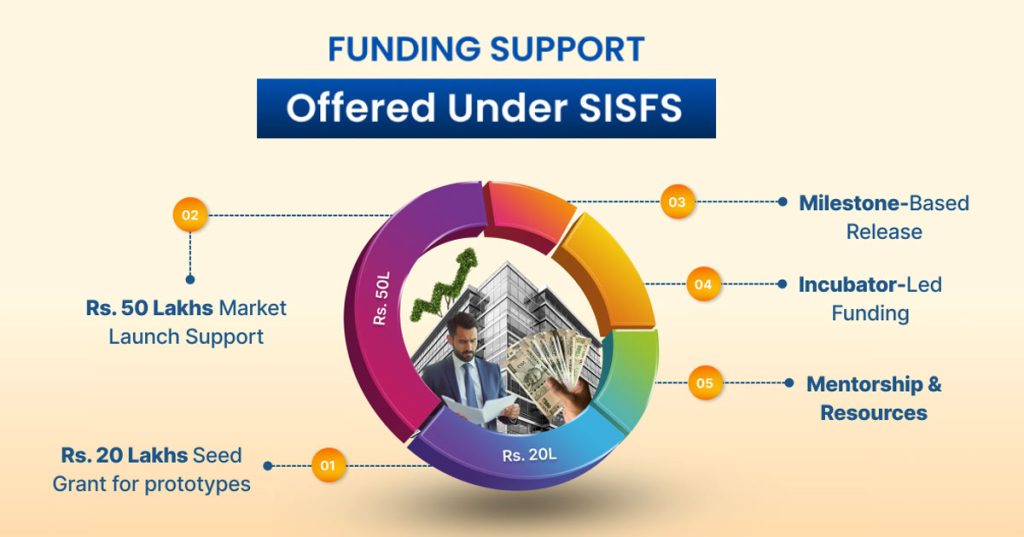
Starting a business is an exciting but tough endeavour. Many startups struggle to fund proof of concept, prototype development, or market entry. Without early financial help, even great ideas often fail to take off. To bridge this gap, the Government of India launched the Startup India Seed Fund Scheme (SISFS) under the Department for Promotion of Industry and Internal Trade (DPIIT).
SISFS is part of the larger Startup India initiative, which promotes innovation, recognition, and entrepreneurship across the country. It is one of the most impactful government schemes for startups in India, designed specifically to support young ventures at the seed stage.
This blog explains how the SISFS works, who can apply, and how it helps entrepreneurs looking to grow their business.
Overview of the Startup India Seed Fund Scheme (SISFS)
The SISFS was launched in April 2021 to give new startups the support they need at the very beginning of their journey. The government set aside Rs. 945 crore to help young founders who have ideas but need that first bit of funding to bring them to life. This early support, called seed funding, helps them:
- Build prototypes,
- Test their product, and
- Take their first steps into the market with confidence.
SISFS does not transfer money directly to startups. Instead, eligible incubators selected by the Expert Advisory Committee (EAC) receive the funds and pass them on to startups. These incubators provide financial support while guiding and mentoring founders. They stand beside startups as they experiment, learn, and refine their products.
Simple and founder-friendly objectives of the scheme are:
- Help startups test and validate their ideas so they can turn concepts into real, working products.
- Make it easier for startups to enter the market and grow their business step by step.
- Build a stronger startup ecosystem by offering mentoring, incubation, and financial support.
- Encourage young founders to innovate and take bold risks without fear of early failure.
By supporting startups during the toughest early stage, the “valley of death”, SISFS helps new ideas survive and grow.
Funding Support Offered Under SISFS

The Startup India Seed Fund Scheme (SISFS) helps startups grow from ideas to successful businesses. It provides financial aid and strategic support through approved incubators. Key offerings include:
- Seed Funding for Early Development: Startups can get:
- Up to Rs. 20 lakh as a grant to build prototypes, test ideas, and develop their first product.
- Up to Rs. 50 lakh through debt or convertible debentures to launch the product, run trials, and enter the market.
- Milestone-Based Disbursement: The incubator releases funds in stages when the startup meets the targets it sets.
- Mentorship & Guidance: Experts provide advice on product design, business strategy, and scaling operations.
- Networking Opportunities: Startups gain access to investors, industry professionals, and other entrepreneurs.
- Capacity Building & Training: Workshops enhance skills in finance, marketing, and operations.
- Access to Infrastructure: Incubators may offer lab space, co-working facilities, and technical equipment.
- Legal & Regulatory Support: Guidance is provided on company registration, compliance, and intellectual property rights.
SISFS ensures startups get funding, guidance, and resources to grow steadily and sustainably.
Note: The funding support under SISFS is generally available for up to 2 years, giving startups enough runway to achieve key milestones and attract further investment.
Key Benefits of the Startup India Seed Fund Scheme
SISFS goes beyond funding to give startups the support they need to grow. It combines financial assistance with mentorship, infrastructure, and ecosystem access, helping young ventures survive and scale.
- Seed Funding for Early Growth: The scheme provides grants and early-stage funding to help startups develop prototypes, test products, and launch in the market. This financial boost allows founders to focus on building their business without worrying about initial capital shortages.
- Mentorship and Expert Guidance: Approved incubators connect startups with experienced mentors and industry experts. This guidance helps founders make informed decisions, refine their business models, and avoid common pitfalls in the early stages.
- Enhanced Investment Opportunities: Startups supported by SISFS gain credibility, which increases their chances of attracting angel investors or venture capital. Early funding and mentorship help startups present a stronger case to future investors.
- Networking and Collaboration: The scheme provides access to a wide startup ecosystem. Founders can collaborate with other startups, incubators, and industry players, enabling knowledge sharing and partnership opportunities.
- Access to Infrastructure and Incubation Facilities: Startups gain access to incubator facilities such as office space, labs, networking events, and technical resources. This support lowers operational costs and provides a professional environment to develop products efficiently.
- Boost to Credibility and Market Visibility: Being part of SISFS increases a startup’s visibility in the industry. It signals trustworthiness to customers, investors, and partners, helping startups gain early traction and market recognition.
Want to understand how SISFS can benefit your startup? Contact RegisterKaro to get detailed guidance on the scheme’s features, eligibility, and application process.
Eligibility Criteria for Startups Under SISFS
To qualify for the Startup India Seed Fund Scheme (SISFS), a startup must meet the following requirements:
- DPIIT Recognition: The startup must be officially recognized under Startup India by the DPIIT.
- Indian Ownership: Indian citizens must hold at least 51% of the startup’s shareholding.
- Age of the Startup: The startup must be less than 2 years old when applying to the incubator. The DPIIT allows this 2-year limit from the date of incorporation, and some incubators, based on EAC guidelines, may even accept slightly older startups in special cases.
- Innovation and Technology Focus: The startup must be technology- or innovation-driven, with a clear proof-of-concept or prototype ready for development or testing.
- Sectoral Focus: Incubators may prioritize certain sectors, such as deep tech, health tech, or social innovation, based on their mandate.
- Funding History: Startups should not have received more than Rs. 10 lakh of financial support under any Central or State government schemes. Startups that have already received significant funding from other government programs may not be eligible.
- Application via Incubators: Startups must apply through empaneled incubators or accelerators. These incubators evaluate, mentor, and support them under SISFS.
This set of criteria ensures that the scheme targets early-stage, high-potential startups that require financial and mentorship support to grow.
Documents Required to Apply for SISFS
To apply for the Startup India Seed Fund Scheme (SISFS), startups need to submit a set of documents through an empaneled incubator. These documents help incubators assess the startup’s eligibility, innovation, and growth potential.
Key documents include:
- DPIIT Recognition Certificate: Proof that the startup is officially recognized under the Startup India initiative.
- Incorporation Certificate: Confirms the legal formation of the company and its date of incorporation.
- Business Plan or Pitch Deck: A detailed overview of the startup’s idea, product, target market, revenue model, and growth strategy. This pitch deck helps incubators understand the potential and feasibility of the business.
- Prototype or Proof of Concept Details: Information on the current stage of product development, testing results, and future plans.
- Financial Statements (if available): Startup’s balance sheet, cash flow statement, or any other financial documents demonstrating current resources and expenses.
- Team and Ownership Details: Profiles of the founding team, their roles, qualifications, and confirmation of at least 51% Indian ownership.
- Other Supporting Documents: Any additional documents requested by the incubator, such as market research, patent filings, or client validation letters.
Want to apply for SISFS but don’t have Startup India (DPIIT) recognition yet? Get your Startup India registration done quickly and correctly with expert help from us.
How to Apply for the Startup India Seed Fund Scheme?
Applying for the SISFS is straightforward, but you must go through an empaneled incubator. Here’s a clear step-by-step guide to do that:
- Register with Startup India: First, create an account on the Startup India portal and get your startup recognized by DPIIT. Recognition is mandatory to apply for SISFS.
- Identify an Empaneled Incubator: Check the list of SISFS-approved incubators on the portal. Your startup must apply through one of these incubators, which will evaluate your application.
- Prepare Application Documents: Prepare a strong application, including:
- Business plan or pitch deck
- Details of the prototype or proof of concept
- Financial statements (if available)
- Team profile and ownership details
- Submit Application via Incubator: Submit your application to the chosen incubator. The incubator reviews the proposal, checks eligibility, and may request additional information.
- Evaluation and Shortlisting: The incubator’s expert committee evaluates applications based on innovation, scalability, market potential, and feasibility. Only shortlisted startups move forward.
- Fund Disbursement in Milestones: Once approved, funds are released in stages tied to milestones. Startups must achieve specific objectives before receiving the next tranche.
- Mentorship and Monitoring: During the funding period, the incubator provides mentorship, guidance, and progress monitoring to ensure effective use of funds.
This structured process ensures that funding reaches high-potential startups and supports them at critical early stages.
Tips for a Strong Application:
- Clearly highlight your innovation and unique value proposition.
- Show a working proof of concept or prototype.
- Present a strong, capable founding team.
- Demonstrate scalability and market potential.
- Explain a clear monetization or revenue model.
What Happens After Funding Under SISFS?
Once a startup receives funding under the SISFS, the journey continues with structured support and monitoring to ensure growth and proper use of funds.
- Milestone Achievement: The incubator releases funds in stages based on specific milestones. Startups must complete objectives like prototype development, market trials, or initial customer acquisition before receiving the next tranche.
- Mentorship and Guidance: Empaneled incubators continue to provide mentorship, strategic advice, and technical guidance. This support helps startups refine their product, optimize operations, and address challenges effectively.
- Progress Monitoring: Incubators regularly track performance and progress. Startups submit updates, financial reports, and other documents to demonstrate how they use funds and achieve milestones.
- Market Scaling and Commercialization: With funding and mentorship in place, startups focus on scaling operations, entering the market, and acquiring customers. This stage aims to make the business self-sustaining and attractive to future investors.
- Preparation for Further Investment: Successful use of SISFS funding enhances a startup’s credibility and visibility, increasing the chances of attracting angel investors, venture capital, or other government funding for the next stage of growth.
In short, after funding, startups gain financial support, mentorship, and structured guidance, helping them transform ideas into market-ready, scalable businesses.
What Types of Startups Are Favoured Under SISFS?
The SISFS prioritizes startups that show high potential for innovation, scalability, and market impact. While the scheme is open to various sectors, certain characteristics make a startup more likely to receive funding:
- Innovation-Driven Startups: Startups with unique ideas or technology-driven solutions are highly favored. The scheme looks for ventures that solve real problems or create new market opportunities.
- Proof of Concept Ready: Startups that already have a working prototype or proof of concept demonstrate feasibility and are more likely to secure funding.
- Technology- or Knowledge-Based Ventures: Incubators prefer startups that leverage deep tech, software, hardware, biotech, or other knowledge-based innovations. These ventures align with the government’s focus on technology-led growth.
- Scalable Business Models: SISFS favors startups with high growth potential. Ventures that can expand operations, reach new markets, or scale production are more attractive for seed funding.
- Social or Impact-Oriented Startups: Incubators encourage startups that address social, environmental, or economic challenges. They often prioritize solutions that create measurable impact on communities or industries.
By focusing on these types of startups, SISFS ensures that funding supports ventures that can create long-term value, generate employment, and strengthen India’s startup ecosystem.
Impact of the SISFS Scheme on Entrepreneurs
The SISFS is transforming India’s startup ecosystem. It provides early-stage funding, mentorship, and resources that help startups grow fast. The scheme supports startups across sectors, including rural, social impact, and tech-based ventures. The scheme shows its impact through the number of startups it has funded, the incubators it has empaneled, and the success stories emerging nationwide. Key highlights as per PIB include:
- Startups Funded: As of December 2024, over 2,600 startups received financial support of Rs. 467.75 crores, enabling them to develop products and scale operations.
- Incubators Empaneled: 213 incubators across India actively support startups with funding, mentorship, and infrastructure.
- Women-Led Startups: More than 1,200 women-led startups secured funding, promoting gender diversity in entrepreneurship.
For founders looking beyond seed funding, exploring options like the MSME Loan Scheme for small businesses can also help secure working capital and expand operations after the SISFS support period.
Frequently Asked Questions
The Startup India Seed Fund Scheme (SISFS) is a government initiative that provides financial and strategic support to early-stage startups. It helps entrepreneurs develop prototypes, validate ideas, enter markets, and scale their business. The scheme is implemented through empaneled incubators across India.




